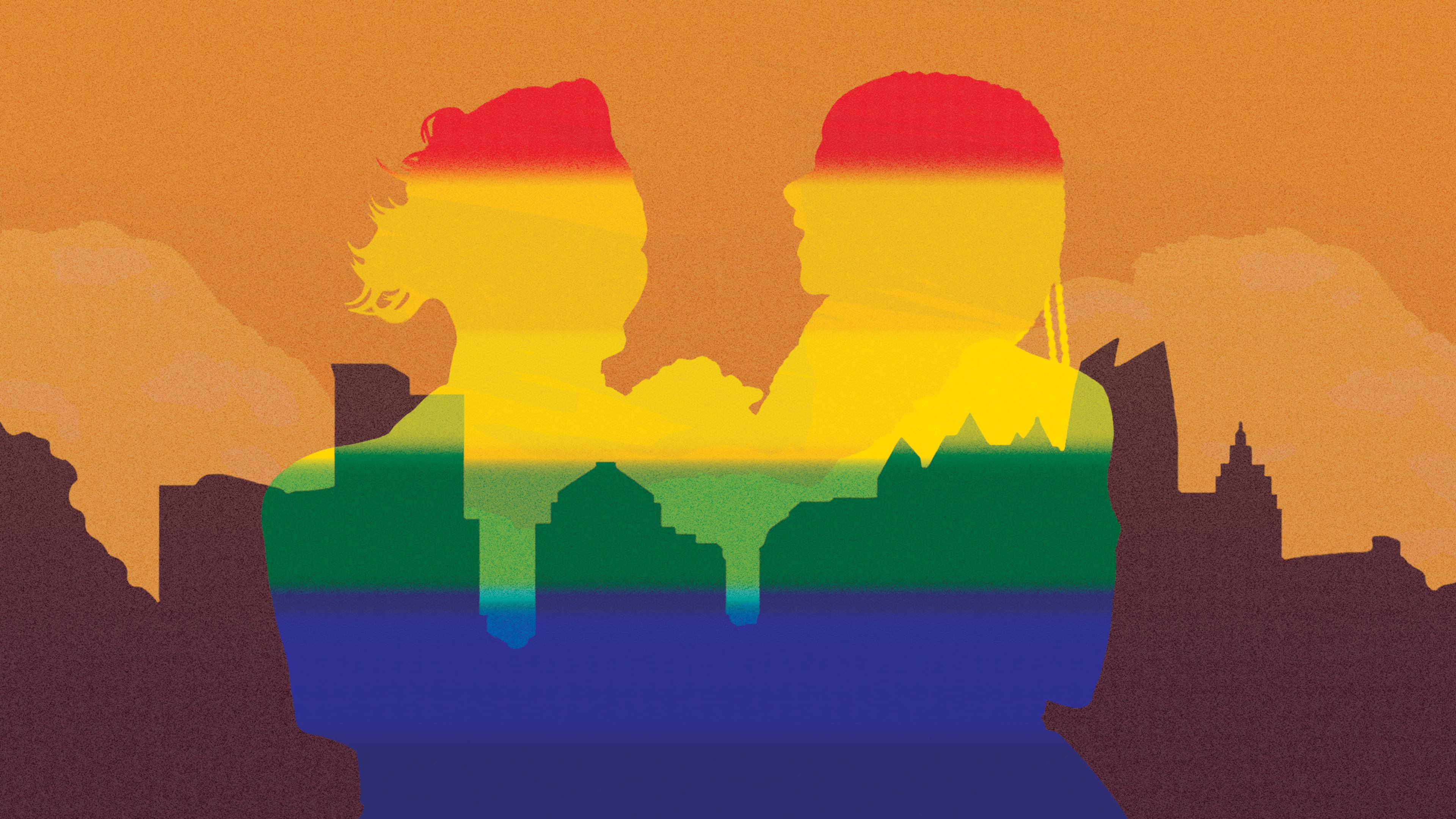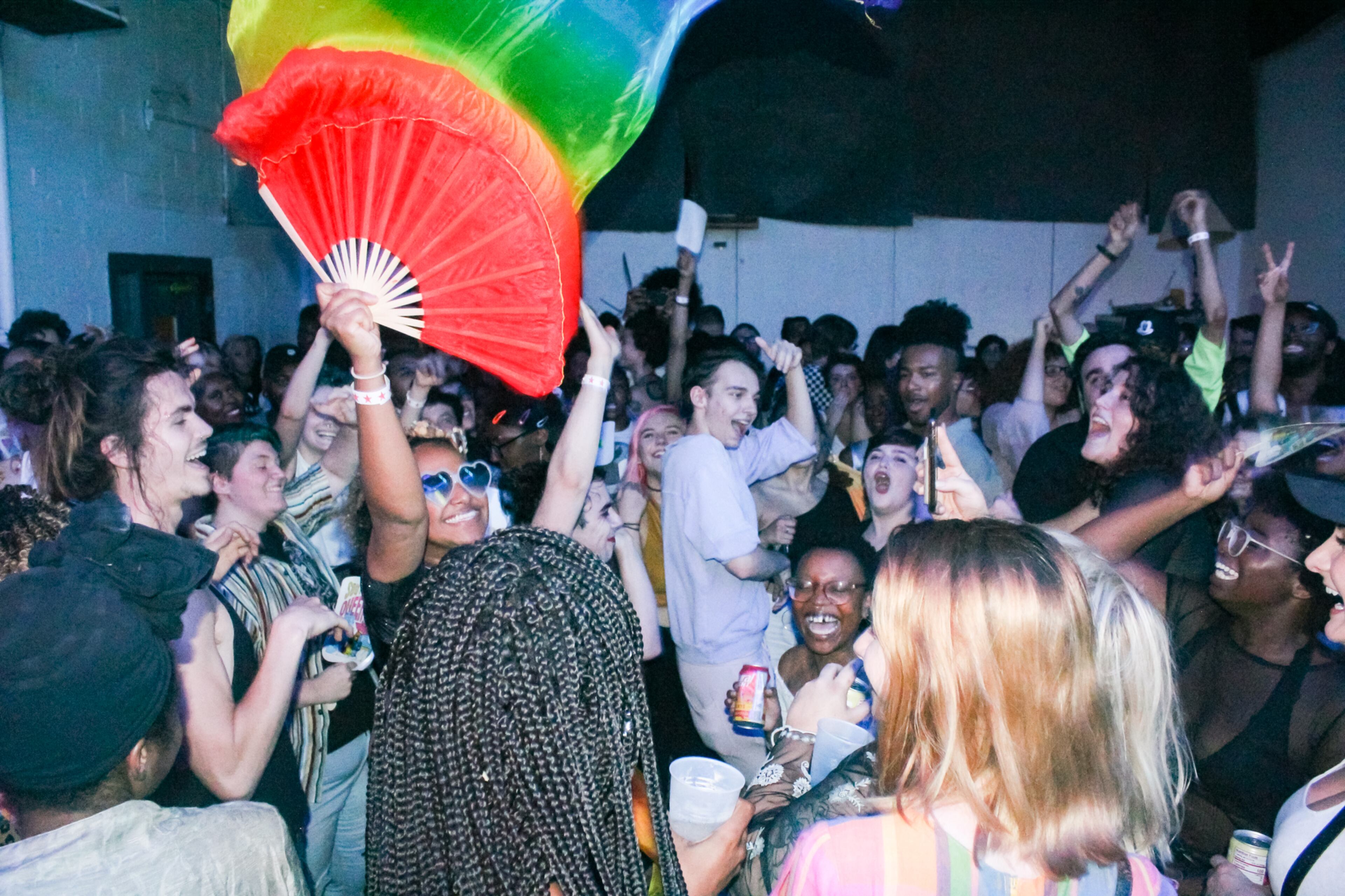The Black queer mecca? Atlanta residents and organizers chime in.

Ava Davis says she “feels as safe as I can for a Black trans woman” living in metro Atlanta.
When the East Point resident is not at home, she and her partner have a safety protocol.
“Before I’m leaving any event, I’m calling him, and I’m letting him know, ‘Hey, I’m on my way home,’” the 39-year-old writer and producer said. “So if I don’t call, then he knows something’s not right. Once I call him, we’re on the countdown.”
For Davis, the phone call is a necessary precaution. In 2023, three Black trans women were shot in Atlanta within a three-month span — two of whom died. Black trans women accounted for half of the fatal violence against trans and gender-expansive communities across the country, according to a 2024 Human Rights Campaign report.
The current Trump administration has signed several executive orders targeting the trans community, including one that states the government will only recognize two sexes: male and female.

Davis hasn’t experienced any transphobic violence. For her, being insulated within Atlanta’s Black LGBTQ community has become a vital source of security, despite recent attacks across the country.
“I recognize part of that as a privilege,” she said. “I just feel at home here. And I don’t know I’d be able to say that anywhere else. I truly don’t.”
Residents and community leaders say the city continues to be a Black queer mecca, one filled with joy and protection. But Atlanta requires more physical spaces and support for all demographics of queerness for the community to thrive.
“Atlanta is the birthplace of civil rights, and that continues to resonate throughout the South, and I think especially for queer Black people from all over the South, Atlanta is a place where you can find community, where you can be accepted for exactly who you are,” Davis said.
Atlanta’s dominance as a Black queer capital

Atlanta hosts three pride celebrations per year: National Pride in June, Atlanta Black Pride during Labor Day weekend and Atlanta Pride in October.
The annual festivities are a direct result of the city’s rich history of LGBTQ pride and resistance, which came to a head in the 1960s with the police raid at Ansley Mall. In 1969, fewer than two months after the Stonewall protests in New York City, Atlanta police raided a screening of Andy Warhol’s “Lonesome Cowboys” (which centers gay cowboys) at Ansley Mall Mini-Cinema because they deemed the film to be too obscene. The raid sparked a queer movement in Atlanta.
Two years later, in 1971, Atlanta held its first pride march in Piedmont Park.
“Atlanta was already a beacon for queer people, where they could come and be themselves, but that raid really solidified the fact that Atlanta fought back,” Davis said.
It’s that extensive legacy and culture that helped shape Davis’ decision to start transitioning in 2019. The Atlanta-raised actor and filmmaker said the city’s Black queer community uplifted her during that time.
“Going through transitioning, there are times where you don’t know how to love yourself, and I needed that support from all of my friends, but especially my Black friends, to say we have space for you. I don’t think it would have been possible anywhere else outside of Atlanta,” Davis shared.

Atlanta Black Pride began with that same sense of community and support. The annual event began in 1996 as a picnic of friends who simply wanted to celebrate themselves. Now, Atlanta Black Pride has become one of the most in-demand LGBTQ celebrations in the country, attracting over 100,000 attendees.
But throwing this year’s celebration came with funding challenges, said Melissa Scott, managing partner of Atlanta Black Pride Weekend.
Scott said the festival was heavily affected by the Trump administration’s cut to DEI programs, citing that corporate sponsors for this year’s festivals dropped from 50 to 13. The weekend’s marquee event is the Pure Heat Community Festival in Piedmont Park.
“We were barely able to still put the event on,” Scott said. “But we had to make it happen. The Pure Heat Festival is a resource. That’s a place where you can go as a homeless, LGBTQ person, and you have the people that are there. The outreach is there. If you’re looking for GED programs, the people that provide that are there. It’s really just a mecca of resources for the LGBTQ community.”
Desire for more physical spaces

Outside of Atlanta’s pride events, one of the first spaces that made Ava Davis feel accepted was Southern Fried Queer Pride.
Founded in 2014, the nonprofit helps empower LGBTQ communities of color in the South. Each year, they host a pride festival in Little Five Points.
Davis started attending their events in 2021 and remembers thinking, “Those are the people I want to be in community with.” The organization later screened Davis’ short film “The Duchess of Grant Park.”
The group’s “unapologetic queerness” became palpable for Davis.
“It just felt like this is it,” she recalls. “This is the future, and I feel so safe and seen here. It felt like it was about building community and building strength by reaching out to each other.”

Taylor Alxndr, founder of Southern Fried Queer Pride, said the group’s work is an extension of “Atlanta being one of the Blackest things in the country that definitely reflects the Black, LGBTQ community.”
However, Alxndr said they’ve seen more Black and brown queer spaces disappear with the rise of new developments and housing costs.
Southern Fried Queer Pride, which doesn’t have its own brick-and-mortar, has previously held events at places like Mammal Gallery and The Bakery — both of which no longer exist.
In 2023, the nonprofit signed a lease for its own space, Clutch. Located in the Oakland City neighborhood, Clutch was supposed to be a center for safety and community. Last year, the organization announced it broke its five-year lease after dealing with “aggressive landlords,” said Alxndr.
Alxndr said the group has shifted its focus to continue building community and being a safe space for queer people of color. They hope that as Atlanta continues to grow, so will more community centers for its LGBTQ residents.
“It feels as if the Black communities have been pushed out of their native communities,” Alxndr said. “We’ve seen low-income Black and brown neighborhoods be (replaced with) townhouses and condominiums for people who just moved here and have more income, and they drive up the prices. When you think about the LGBTQ community, specifically in Atlanta, a lot of it is Black and brown. Think about all those people who are trying to access the city and all the community that’s there, but now they can’t afford to live in a space that’s also driving them away.”
For Davis, also having a centralized space for queer creatives is just as essential.
“We should also have facilities for more queer theaters,” says Davis, a board member for Out on Film, Atlanta’s LGBTQ film festival, who’s adamant about highlighting trans stories and filmmakers. “We would like our own theater space so that we are in control of our own destiny.”
Protecting queer elders and beyond

Despite being known as the queer capital of the South, Atlanta doesn’t have its own community-driven LGBTQ center. A new feasibility study is set to change that. Malik Brown, Atlanta’s former director of LGBTQ affairs, is the project manager of the city-led research, in partnership with Atlanta-Fulton County Recreation Authority, which is working to develop the space.
The Atlanta City Council approved a plan last year. A community input survey, which asks residents what they want to see in an LGBTQ center, was released in March.
So far, the survey has garnered over 2,700 responses. Once it closes on Oct. 17, Brown and his team will explore the data and present their findings to the City Council in December. He estimates that construction for the proposed center will cost $30-50 million.
“As we sort of think about how resources are spread and how people navigate our queer infrastructure the center makes a ton of sense to become this centralized hub in a way that still complements all of the existing nonprofits, collaborates with them, brings them together, breaks down silos, and honestly, at the end of the day, I think, unlocks more resources and more capacity,” Brown said.
Brown shared that the top needs he’s seen from respondents are mental health resources and more programming for youth and elders.
The Atlanta-based Zami NOBLA, or National Organization of Black Lesbians on Aging, was founded in 2011. The membership-based organization promotes advocacy, education and community for Black lesbians ages 40 and up.
Zami NOBLA has roughly 220 paid members, along with 1,600 women across the country in their private Facebook group. The nonprofit conducts peer-reviewed research, participates in community gardening and has its own musical ensemble, among other activities.

Mary Anne Adams, Zami NOBLA’s founder, said the group‘s mission is to ensure Black queer elders are protected, loved and safe.
She said that although Atlanta will likely always remain a Black queer mecca, more attention is needed on the various demographics in the community.
“Atlanta is very youth-oriented in terms of LGBTQ community,” Adams, 71, said. “We’d go to places and it’d be like, ‘Why are you here? You’re too old to be here. You shouldn’t be here. This is not your jam.’ So folks would leave, they would go home, and they would become very socially isolated.”
Adams’ observations are also informed by her job as a social worker and public health researcher.
“I know what social isolation can do, and it can lead to loneliness, depression, death, all kinds of issues. So I started to give voice and visibility to older Black lesbians, so that we were centered and we were not on the periphery,” she said.
Establishing adequate health care and support for LGBTQ elders is one of the goals of Dewayne Queen, Atlanta’s new director of LGBTQ affairs. Queen officially started his role in June.
Concerns for LGBTQ seniors, along with economic mobility for the city’s trans population and more housing resources, are among the issues Queen heard at his first town hall in August with residents and community leaders. He said having those conversations is a main priority as he gets settled into the new gig.
Queen plans to host the town halls every quarter.
“I understand that community put me in this position, and so I always have to make sure that I give community space to be heard and be seen and be felt,” Queen said. “It would be in vain if I don’t create programming that answers the questions or at least gives voice to what communities in this present moment.”
For residents like Davis, the city’s commitment to uplifting local voices and embracing an inclusive LGBTQ culture is something she doesn’t take lightly.
“I feel like I’m fortunate to live a very queer life,” Davis said. “Being in Communion with so many queer people, including theater people and film people, it’s the privilege that not many are able to be afforded.”
ABOUT THIS SERIES
“Atlanta: America’s Black Mecca?” is an original content series from UATL that explores that question with data-driven, thoughtful reporting that prioritizes the voices of locals and transplants who call this city home. These stories will appear in the paper, UATL.com and AJC.com each month through January 2026.
Got a Black Mecca story to tell? We want to hear about your experiences. Hit us up at uatl@ajc.com.
Become a member of UATL for more stories like this in our free newsletter and other membership benefits.
Follow UATL on Facebook, on X, TikTok and Instagram.
